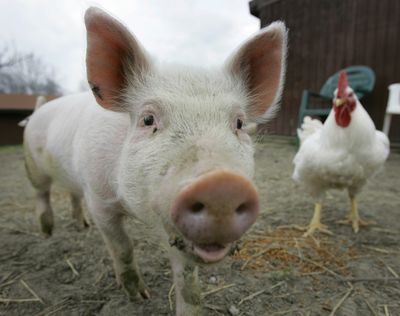Campaign aims to show farm animals’ intelligence

NEW YORK – There’s extensive evidence that pigs are as smart and sociable as dogs. Yet one species is afforded affection and respect; the other faces mass slaughter en route to becoming bacon, ham and pork chops.
Seeking to capitalize on that discrepancy, animal-welfare advocates are launching a campaign called The Someone Project that aims to highlight research depicting pigs, chickens, cows and other farm animals as more intelligent and emotionally complex than commonly believed. The hope is that more people might view these animals with the same empathy that they view dogs, cats, elephants, great apes and dolphins.
“When you ask people why they eat chickens but not cats, the only thing they can come up with is that they sense cats and dogs are more cognitively sophisticated than species we eat – and we know this isn’t true,” said Bruce Friedrich of Farm Sanctuary, the animal-protection and vegan-advocacy organization that is coordinating the new project.
“What it boils down to is people don’t know farm animals the way they know dogs or cats,” Friedrich said. “We’re a nation of animal lovers, and yet the animals we encounter most frequently are the animals we pay people to kill so we can eat them.”
The lead scientist for the project is Lori Marino, a lecturer in psychology at Emory University who has conducted extensive research on the intelligence of whales, dolphins and primates. She plans to review existing scientific literature on farm animals’ intelligence, identify areas warranting new research, and prepare reports on her findings that would be circulated worldwide via social media, videos and her personal attendance at scientific conferences.
“I want to make sure this is all taken seriously,” Marino said. “The point is not to rank these animals but to re-educate people about who they are. They are very sophisticated animals.”
According to Farm Sanctuary, cows become excited over intellectual challenges, chickens can navigate mazes and anticipate the future, and sheep can remember the faces of dozens of individual humans and other sheep for more than two years.
For Marino and Friedrich, who are both vegans, the goals of the project are twofold – to build broader public support for humane treatment of farm animals and to boost the ranks of Americans who choose not to eat meat.
“This project is not a way to strong-arm people into going vegan overnight but giving them a fresh perspective and maybe making them a little uncomfortable,” Marino said.
The major associations representing chicken and pork producers say the farmers they represent already have taken strides to minimize cruel treatment of farm animals.
“While animals raised for food do have a certain degree of intelligence, Farm Sanctuary is seeking to humanize them to advance its vegan agenda – an end to meat consumption,” said David Warner of the National Pork Producers Council.
Thomas Super of the National Chicken Council said efforts to link farm animals with household pets was part of a strategy to create a “meat-free society.” He also contended that the farmers and companies involved in raising chickens have a vested interest in ensuring they are well-treated.
While The Someone Project will encompass several species of farm animals, pigs are likely to be one of the prime subjects, given the breadth of past studies of their intelligence and behavior. Some researchers say pigs’ cognitive abilities are superior to 3-year-old children, as well as to dogs and cats.
Treatment of pigs has been a political issue in several states due to efforts to pass laws banning the confinement of breeding pigs in gestation crates.
Bernard Rollin, a Colorado State University professor who teaches both philosophy and animal science, said he expected increasing numbers of meat-eaters to join the ranks of those demanding changes in the way pigs are housed at many large facilities.
“You have to have ideological blindness to think these animals are not intelligent,” Rollin said. “I hope we go back to an agriculture that works more with the animals’ biological and psychological needs and nature rather than against them.”